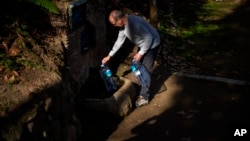Spain's populous northeastern region of Catalonia declared a drought emergency on Thursday as people in Barcelona and the surrounding areas struggle with water restrictions due to drought.
The reservoirs from the Ter and Llobregat rivers, which serve 6 million people in northern Catalonia, are at less than 16% of their capacity. That is a historic low in a region that has experienced three years of elevated temperatures and low rainfall, a pattern that is expected to get worse with climate change. A 2022 study showed that the Iberian Peninsula is its driest in 1,200 years.
"We are entering a new climate reality," Catalan Regional President Pere Aragones said on announcing the emergency. "It is more than likely we will see more droughts that will be both more intense and more frequent."
The drought emergency disproportionately affects rural communities in the Catalan countryside that already have been struggling to find water for drinking and livestock. The limitations have reduced water access for herd animals by 50% and for crop irrigation by 80%.
"It is telling that this drought makes headlines simply because it affects Barcelona … when we have villages in the Pyrenees that have endured water shortages and have needed to get water brought in by truck for several months," said Dante Maschio, spokesperson for the Catalan nonprofit Aigua es vida, or Water Is Life, organization.
"If the drought is not managed correctly, it can lead to greater inequality and tension between cities and rural areas," Maschio said.
The drought emergency declaration sets into motion restrictions including limits to daily water usage for residential and municipal purposes, which are susceptible to increases if the drought persists. In addition, residents will be banned from washing their cars and filling up empty swimming pools, with some exceptions for limited use in sports.
Residents and businesses who do not abide by the restrictions could face fines, according to the Catalan authorities in Barcelona. To supplement the restrictions and lack of water access, some towns are shipping in tanker trucks of water, often at a large expense.
Catalan government leaders are scheduled to confer with Teresa Ribera, Spain's minister of ecology transition, on Monday to explore potential assistance from the Madrid government.
Some information for this report was provided by Agence France-Presse, The Associated Press and Reuters.





